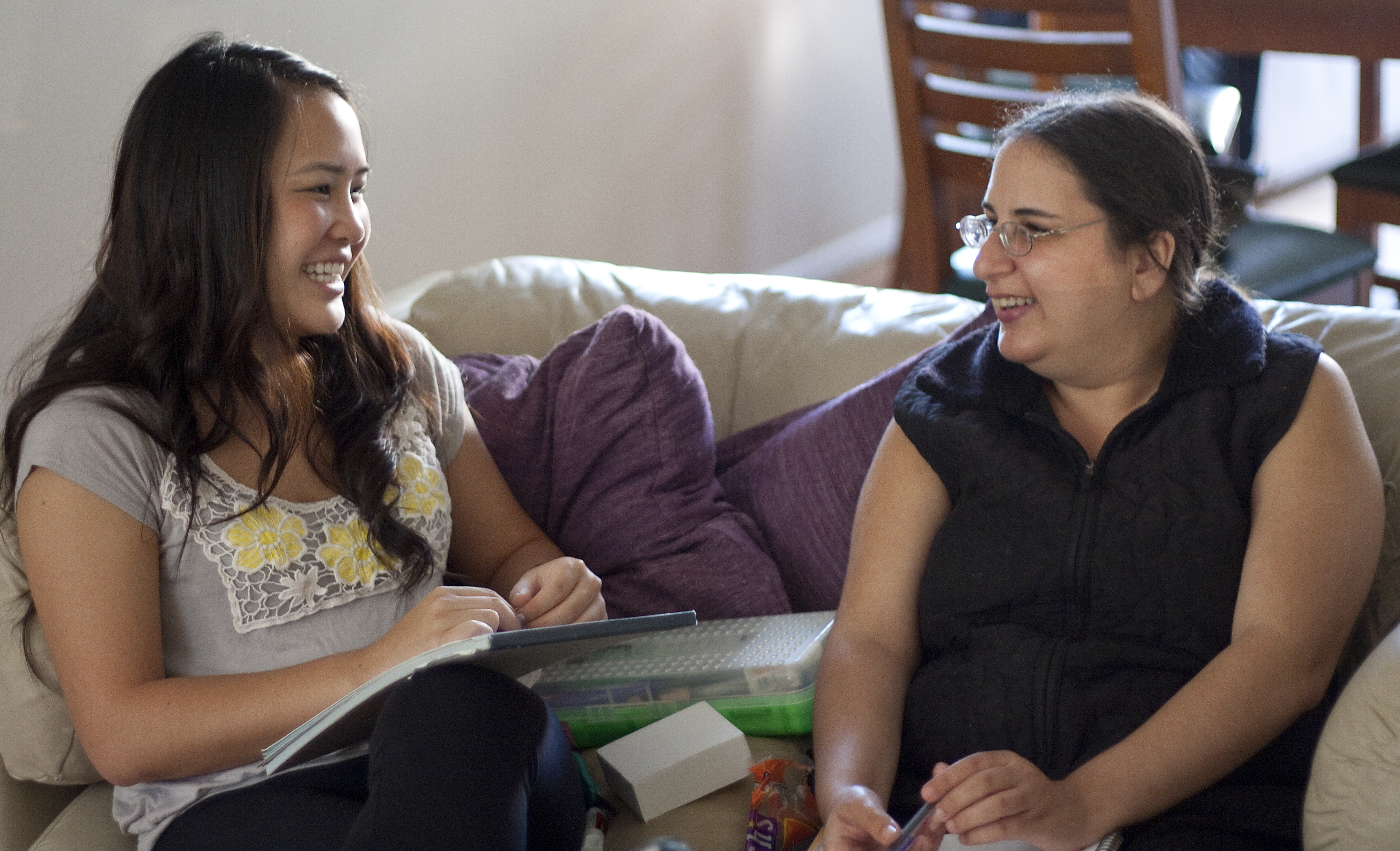Best Buddies look beyond disability diagnosis to form friendships

By Andra Lim
Oct. 14, 2011 11:35 a.m.

Members of Best Buddies, an organization that fosters one-on-one friendships with developmentally disabled individuals, spend time with each other.

At first, Kelsey Hwang and Natalie Yaccobe define their friendship in the usual terms ““ they text nearly every day, talk about boy problems and go shopping for accessories.
But as they continue to describe their relationship, other meanings start to emerge.
Hwang, a fourth-year psychobiology student, met Yaccobe three years ago through Best Buddies at UCLA. The organization pairs students with mentally and physically disabled people.
These one-on-one friendships are based on seeing a person through their frustrations, fears, hopes and interests ““ not simply through a disability diagnosis, said Allie Beatty, a second-year neuroscience student and public relations director of Best Buddies.
As a small group of buddies hangs out on Sunday afternoon, making cupcakes and watching “Shrek,” the familiarity they’ve built up over the past few years shows.
“We’ve had some good conversations, we talked about her disability,” Hwang said, and turns to Yaccobe, who’s sitting next to her at the dining table. “Like you were born with a learning disability and have always wanted to go to school.”
Yaccobe, 28, said she has dyslexia. Her diagnosis has made it hard for her to form close relationships with her classmates at West Los Angeles College, and she spends her time on campus alone, she said.
Sometimes, she feels angry at the way she was born and throws books, rips up paper and gets into fights with her mother.
“My mom says I don’t have a disability and says I’m perfect, but I don’t think I am,” Yaccobe told her friend.
“I don’t think anyone can be perfect,” said Hwang, smiling and leaning toward her. “I’m not perfect.”
Best Buddies is an international organization with programs at middle schools, high schools and colleges. The UCLA chapter started in 1990, one year after the nonprofit was founded, said Kaley Woods, a fourth-year bioengineering student and secretary of the group.
Now, about 35 UCLA students are paired with buddies, who range in age from 18 to 58. Group members are required to contact their buddies once a week and see their buddies twice a month.
Distance can make it difficult for the buddies to meet up more often than that. When the entire chapter gets together for events, such as a picnic in the park, group members spend a couple of hours driving around Los Angeles and picking up all the buddies.
Sometimes, students can unintentionally offend buddies by offering help when it’s not needed or by using certain words, Woods said. Or, buddies may get very attached, calling a student many times a day.
“Best Buddies has made me a lot more patient,” Woods said. “And while a lot of people put a guard up, with a lot of buddies, there’s nothing they’re afraid to talk about ““ it’s just really honest.”
About half of the buddies are in Pathway, a two-year program run by UCLA Extension where disabled students take classes, work at an internship and live together in a Westwood apartment complex. At the end of the program, students receive a certificate in learning and life skills.
Many of these buddies are 18 to 22 years old, and the age overlap can make it easier for them to connect with UCLA students, Beatty said.
“It is sometimes difficult for a lot of young people, with and without disabilities, to go from being in high school or wherever else and coming to this big university,” said Eric Latham, executive director of Pathway. “It’s nice that we have this built-in connection.”
Yaccobe participated in Pathway but dropped out because living away from home was too stressful. She had seven panic attacks, one while she was in the dining hall.
Hwang once received a call from Yaccobe during an attack ““ it sounded like she was crying, and her breath was heavy.
“I had no one else to call,” Yaccobe said.
Hwang, who had no way to get Yaccobe to the hospital, tried to get her to relax and told her to contact her mother.
On a day-to-day basis, their conversations are lighter in nature.
They talk about Yaccobe’s dream of returning to UCLA as an undergraduate student. They talk about her grades at community college, which she’s trying to keep up.
And in turn, they talk about Hwang’s life.
“Natalie … always asks everything about me,” Hwang said. “How I am, how school is, she remembers my boyfriend, asks about my younger sister who goes here, asks about my parents.”
These are the types of questions buddies frequently exchange. The one that seems most obvious ““ “What is your disability diagnosis?” ““ is sometimes never asked because it’s not as important, Beatty said.
But in public, the disability is all some people can see. Woods said that cashiers get impatient when her buddy takes longer to get out her wallet and count money. Others talk slower or louder, thinking that she won’t understand.
Even at UCLA, the disabled community is unintentionally framed in a negative light, Beatty said.
“I hear people say, “˜Oh that’s so retarded.’ I don’t think they mean to say, “˜Oh, that’s like someone who has a disability,'” she said. “But it still equates someone who has a disability with a negative connotation.”
As the buddies wind down Sunday afternoon together, however, the atmosphere is defined not by what makes them different but what they are all sharing ““ a movie, food and friendships.


